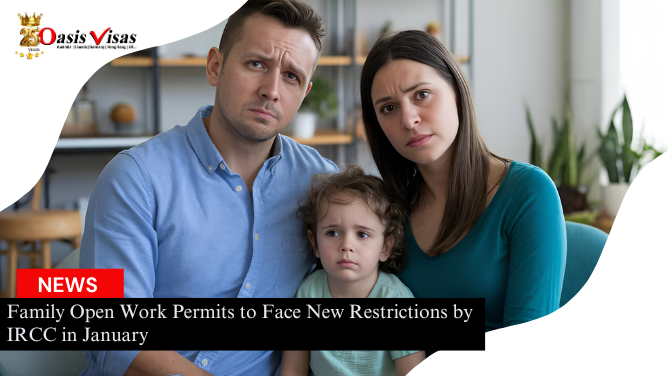
The Canadian government has announced stricter rules for family members of international students and foreign workers seeking Open Work Permits (OWPs). These changes, initially revealed in September 2024, will officially take effect on January 21, 2025.
Changes for International Students
Under the new rules, family OWPs will be available only to the spouses or common-law partners of international students enrolled in specific programs, including:
- Master’s programs lasting 16 months or longer
- Doctoral programs
- Selected professional programs (detailed list below)
This change means that spouses of students enrolled in shorter master’s programs will no longer be eligible for OWPs, tightening the previous criteria.
Changes for Foreign Workers
For foreign workers, family OWPs will now only be available to spouses or common-law partners of workers employed in:
- TEER 0 occupations (managerial roles)
- TEER 1 occupations (jobs requiring a university degree)
- Certain TEER 2 and TEER 3 occupations in key sectors, such as:
- Healthcare
- Education
- Natural resources
- Construction
- Sports
- Military
- Natural and applied sciences
A comprehensive list of eligible TEER 2 and TEER 3 occupations will be published by Immigration, Refugees and Citizenship Canada (IRCC) on January 21, 2025.
To qualify, the primary work permit holder must have at least 16 months of validity remaining on their permit at the time their spouse or partner applies for an OWP. Notably, dependent children of foreign workers will no longer be eligible for family OWPs.
Renewal of Existing Permits
Work permits already issued to family members under previous policies will remain valid until their expiration date. Family members already in Canada can apply for a renewal, provided their requested renewal duration matches the validity of the sponsoring study or work permit.
Eligible Programs for International Students
Outside of master’s and doctoral programs, students enrolled in the following fields can still qualify their spouse or partner for a family OWP:
- Doctor of Dental Surgery (DDS/DMD)
- Bachelor of Law or Juris Doctor (LLB, JD, BCL)
- Doctor of Medicine (MD)
- Doctor of Optometry (OD)
- Pharmacy (PharmD, BSc, BPharm)
- Doctor of Veterinary Medicine (DVM)
- Bachelor of Science in Nursing (BScN, BSN)
- Bachelor of Nursing (BN)
- Bachelor of Education (BEd)
- Bachelor of Engineering (BEng, BE, BASc)
Exceptions to the Policy
Certain groups will not be impacted by these changes:
- Spouses and common-law partners of workers under Free Trade Agreements (FTAs)
- Spouses or partners applying for a Spousal Open Work Permit (SOWP) while being sponsored for permanent residence by a Canadian partner, as long as they hold legal temporary status in Canada.
Why These Changes Are Being Made
The IRCC decision to tighten eligibility for family OWPs is part of a broader effort to address Canada’s housing and infrastructure challenges by reducing the number of temporary residents in the country. When announcing the changes in September 2024, Immigration Minister Marc Miller estimated that these restrictions could reduce the issuance of family OWPs by 50,000 for international students and 100,000 for foreign workers over the next three years.
The Value of Open Work Permits
Open Work Permits provide significant flexibility, allowing holders to work for any employer in Canada without being tied to a specific job or location. This distinguishes OWPs from employer-specific work permits, which often require a Labour Market Impact Assessment (LMIA).
As these changes come into effect, applicants are encouraged to review the updated criteria and assess their eligibility carefully. IRCC will release additional details, including the full list of eligible TEER 2 and TEER 3 occupations, on January 21, 2025.









